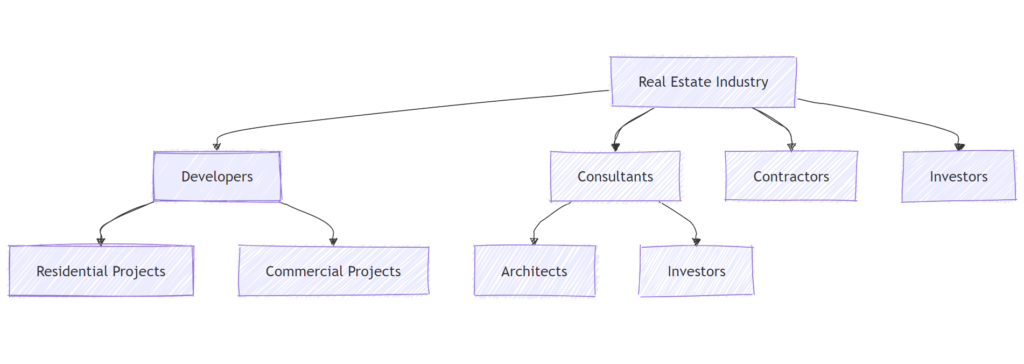India’s real estate sector is undergoing a transformative shift, positioning itself as one of the largest employment hubs in the country. With a remarkable compound annual growth rate (CAGR) of 18.7%, it is poised to create unprecedented career opportunities across various segments, attracting talent from all walks of life. As the industry evolves, professionals from diverse backgrounds, including technology, finance, architecture, and engineering, are finding exciting career paths that promise long-term growth. This burgeoning sector, now intertwined with cutting-edge technologies, has solidified its role as a key contributor to India’s economy and employment landscape.
Real Estate: A Catalyst for Economic and Employment Growth
The Indian real estate industry, often referred to as a “mother industry,” is becoming a cornerstone of economic progress. Besides being the second-largest employment generator after agriculture, its influence extends to various ancillary sectors such as construction materials, consulting, and even PropTech startups. With over ₹40,000 crore invested in emerging PropTech companies, the real estate ecosystem is rapidly expanding, providing a plethora of job opportunities for skilled professionals in architecture, data science, technology, and finance.
As the demand for modern infrastructure grows, real estate is becoming the backbone of India’s urban and rural development. This rapid expansion brings with it the need for an extensive workforce across both core and auxiliary functions.
The Real Estate Value Chain: Expanding Career Horizons
Real estate offers a vast value chain that supports professionals at every stage of development. From residential and commercial developers to contractors, consultants, and engineers, this industry encompasses a wide range of functions:
- Developers: Residential, commercial, and industrial real estate developers are at the heart of property creation. Their roles involve conceptualizing projects, acquiring land, securing financing, and executing construction plans.
- Consultants: Architects, civil engineers, and urban planners help shape the skyline of India’s cities and towns. These professionals not only design the physical structures but also ensure that environmental and regulatory standards are met.
- Contractors: Builders and contractors form the operational backbone, executing construction activities according to detailed plans, while ensuring quality and safety standards.
- Investors: Institutional and individual investors play a pivotal role in financing real estate projects, making real estate investment trusts (REITs) and private equity important career avenues.
In addition to these traditional roles, the advent of technology is unlocking new opportunities for professionals in data analytics, 3D modeling, and artificial intelligence (AI).

Technology and Real Estate: The Rise of PropTech
The integration of technology has opened new doors in the real estate sector, especially in areas like big data, artificial intelligence, and virtual reality. PropTech, a burgeoning field within real estate, is helping revolutionize property management, sales, and development processes.
Emerging technologies are reshaping how properties are bought, sold, and managed. Some key trends driving the sector include:
- Big Data and Predictive Analytics: Data scientists and analysts are becoming increasingly vital to real estate firms. Using big data, these professionals forecast market trends, predict property values, and offer insights into buyer behavior, making data-driven decisions essential in today’s fast-paced environment.
- 3D Modeling and Virtual Reality: These technologies allow prospective buyers to explore properties through immersive virtual tours, drastically reducing decision-making time for both buyers and developers. Professionals with expertise in 3D modeling are in high demand to create these virtual experiences.
- Artificial Intelligence (AI): AI-driven tools are streamlining property management, tenant communications, and even predicting maintenance needs, making property management more efficient and cost-effective.
As the industry embraces these technologies, career prospects for tech-savvy individuals in the fields of AI, machine learning, and data science are expanding rapidly.
Finance: The Backbone of Real Estate
The financial health of any real estate venture is crucial, and finance professionals are indispensable to the sector’s success. Opportunities exist in:
- Investment Banking and Private Equity: These fields offer lucrative opportunities for those interested in raising capital for large-scale projects or acquiring equity in growing firms. The rise of REITs has further opened the door for individuals with financial expertise to invest in real estate portfolios, generating stable income streams.
- Corporate Finance: Real estate developers and firms rely heavily on corporate finance professionals to manage cash flows, secure funding for projects, and ensure financial sustainability.
Professionals with strong financial acumen will continue to be in high demand as the industry expands.
Also Read: Comprehensive Analysis of SWAMIH Investment Fund: A Transformative Approach to Real Estate in India
Engineering, Architecture, and Sustainability: Building the Future of India’s Skylines
As India continues its rapid urbanization, there is a growing demand for sustainable infrastructure. Architects and engineers are at the forefront of this development, tasked with creating the modern skylines of the country. With the rise of green building practices and environmental sustainability, professionals in these fields are needed to design energy-efficient, eco-friendly structures.
- Civil Engineering: Civil engineers play a key role in ensuring that buildings are constructed to last while adhering to safety and environmental standards.
- Sustainable Design: Architects specializing in green design are critical to reducing the environmental impact of urban development.
The Future of Employment in Real Estate: A Multi-Skilled Workforce
With the real estate sector’s rapid growth, there is a significant demand for skilled professionals from a wide array of disciplines. However, the challenge lies in addressing the skills gap. Industry experts stress the importance of not just having a degree, but also a specialization in fields like finance, technology, or design to remain competitive in the job market.
Empowering Women in Real Estate
The real estate sector, historically dominated by men, is witnessing a paradigm shift. Industry leaders are increasingly recognizing the importance of gender diversity. Equal opportunities for women professionals in real estate are crucial for the industry’s sustainable growth. Women are taking up leadership roles in various domains including project management, sales, finance, and corporate leadership.
The real estate industry offers several pathways for both fresh graduates and seasoned professionals. Career development opportunities abound in fields like data science, architecture, investment banking, and property management. However, ongoing training and skill enhancement are necessary to stay ahead in this fast-evolving landscape.
Subscribe to get updates on our latest posts and market trends.






Join The Discussion